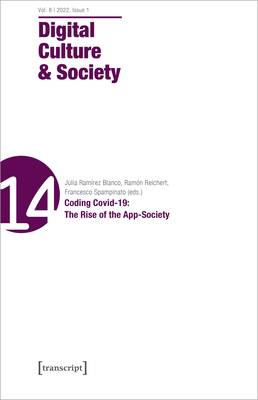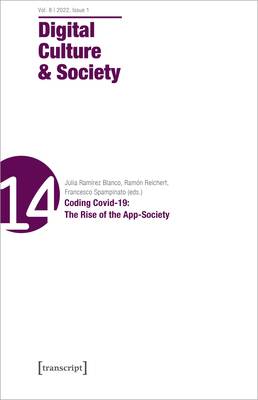
- Afhalen na 1 uur in een winkel met voorraad
- Gratis thuislevering in België vanaf € 30
- Ruim aanbod met 7 miljoen producten
- Afhalen na 1 uur in een winkel met voorraad
- Gratis thuislevering in België vanaf € 30
- Ruim aanbod met 7 miljoen producten
Zoeken
Digital Culture & Society (Dcs)
Vol 8, Issue 1/2022 - Coding Covid-19: The Rise of the App-Society
€ 59,45
+ 118 punten
Omschrijving
Code is intended both as a computer-based language to program software and as a functional and visual language for organizing administrative processes, visualizing information, performing behaviour control, and reinforcing shared imaginaries based on surveillance and dread. This special issue of Digital Culture & Society deals with the concept of code in relation to the Covid-19 crisis. The contributions depart from the idea that both forms of coding have become dramatically intertwined during the pandemic and are structuring a new way of being in and seeing reality. They explore the new forms of data-driven surveillance and representation of the pandemic evolution at the level of real-time epidemiology, sensor technologies, science policies, push media, and the heterogeneous counter-discourses that try to subvert them.
Specificaties
Betrokkenen
- Uitgeverij:
Inhoud
- Aantal bladzijden:
- 144
- Taal:
- Engels
- Reeks:
Eigenschappen
- Productcode (EAN):
- 9783837659030
- Verschijningsdatum:
- 11/07/2023
- Uitvoering:
- Paperback
- Formaat:
- Trade paperback (VS)
- Afmetingen:
- 170 mm x 244 mm
- Gewicht:
- 244 g

Alleen bij Standaard Boekhandel
+ 118 punten op je klantenkaart van Standaard Boekhandel
Beoordelingen
We publiceren alleen reviews die voldoen aan de voorwaarden voor reviews. Bekijk onze voorwaarden voor reviews.







